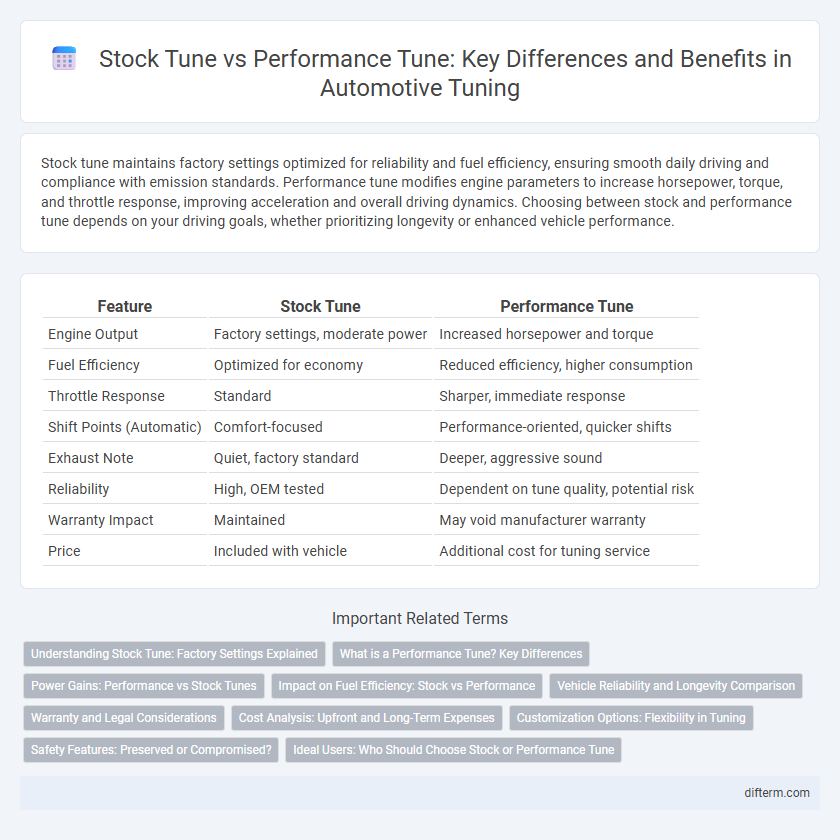Stock tune maintains factory settings optimized for reliability and fuel efficiency, ensuring smooth daily driving and compliance with emission standards. Performance tune modifies engine parameters to increase horsepower, torque, and throttle response, improving acceleration and overall driving dynamics. Choosing between stock and performance tune depends on your driving goals, whether prioritizing longevity or enhanced vehicle performance.
Table of Comparison
| Feature | Stock Tune | Performance Tune |
|---|---|---|
| Engine Output | Factory settings, moderate power | Increased horsepower and torque |
| Fuel Efficiency | Optimized for economy | Reduced efficiency, higher consumption |
| Throttle Response | Standard | Sharper, immediate response |
| Shift Points (Automatic) | Comfort-focused | Performance-oriented, quicker shifts |
| Exhaust Note | Quiet, factory standard | Deeper, aggressive sound |
| Reliability | High, OEM tested | Dependent on tune quality, potential risk |
| Warranty Impact | Maintained | May void manufacturer warranty |
| Price | Included with vehicle | Additional cost for tuning service |
Understanding Stock Tune: Factory Settings Explained
Stock tune refers to the factory-set engine parameters optimized for a balance of fuel efficiency, emissions compliance, and reliability to meet manufacturer specifications and regulatory standards. These settings include fixed ignition timing, air-fuel ratios, and boost pressures designed to ensure safe operation under a wide range of conditions. Understanding the stock tune is essential for identifying the limitations and potential areas for improvement in a vehicle's performance tuning process.
What is a Performance Tune? Key Differences
A performance tune optimizes a vehicle's engine parameters, such as air-fuel ratio, ignition timing, and boost pressure, to maximize horsepower and torque for enhanced driving dynamics. Unlike a stock tune, which prioritizes factory settings for reliability and emissions compliance, a performance tune often sacrifices fuel efficiency and emissions for improved acceleration and throttle response. Key differences include recalibrated ECU maps in performance tunes that allow increased power output, while stock tunes maintain conservative settings to ensure long-term engine durability.
Power Gains: Performance vs Stock Tunes
Performance tunes deliver significantly higher power gains compared to stock tunes by optimizing engine parameters such as air-fuel ratio, ignition timing, and boost pressure. Stock tunes prioritize reliability and emissions compliance, resulting in conservative power outputs typically 10-20% lower than performance tunes. Upgrading to a performance tune can increase horsepower and torque by 20-40%, depending on the vehicle and tuning strategy.
Impact on Fuel Efficiency: Stock vs Performance
Stock tunes optimize engine parameters for balanced fuel efficiency and emissions, ensuring manufacturers meet regulatory standards while providing reliable daily driving performance. Performance tunes recalibrate fuel injection, ignition timing, and boost pressure to maximize power output, which often leads to increased fuel consumption under aggressive driving conditions. Fuel efficiency in performance tunes varies widely depending on the tune's aggressiveness and driving style but generally results in higher fuel usage compared to stock settings.
Vehicle Reliability and Longevity Comparison
Stock tune settings prioritize manufacturer-tested parameters ensuring optimal vehicle reliability and longevity by maintaining engine components within safe operational limits. Performance tunes often increase power output by altering air-fuel ratios, ignition timing, and boost pressure, which can stress engine components and potentially reduce lifespan if not carefully managed. Choosing a tune with a focus on durability incorporates conservative adjustments and thorough testing to balance enhanced performance without compromising long-term vehicle integrity.
Warranty and Legal Considerations
Stock tunes preserve factory settings, ensuring compliance with manufacturer warranties and emissions regulations, minimizing the risk of voiding warranty coverage. Performance tunes often alter engine parameters beyond OEM specifications, which can lead to warranty denial and potential legal issues related to emissions non-compliance. Vehicle owners should review warranty terms and local laws before opting for performance tuning to avoid unexpected costs or penalties.
Cost Analysis: Upfront and Long-Term Expenses
Stock tunes offer lower upfront costs as they are factory settings designed for reliability and efficiency, minimizing the need for immediate modifications or upgrades. Performance tunes require a higher initial investment due to specialized software and potential hardware enhancements aimed at boosting horsepower and torque. Over the long term, stock tunes often incur fewer maintenance expenses, while performance tunes may lead to increased wear on engine components, resulting in higher repair and part replacement costs.
Customization Options: Flexibility in Tuning
Stock tune offers limited customization options, focusing on factory settings designed for a broad range of vehicles and optimal reliability. Performance tune provides extensive flexibility, allowing adjustments to fuel maps, ignition timing, and boost levels tailored to specific driving styles and modifications. Advanced performance tuning supports real-time data logging and adaptive strategies, maximizing engine efficiency and power output for customized applications.
Safety Features: Preserved or Compromised?
Stock tune settings prioritize factory safety features such as traction control, stability control, and optimized engine mapping to ensure reliability under varied driving conditions. Performance tunes often modify these parameters to boost power and responsiveness but may compromise safety features by reducing electronic intervention or altering fuel maps, increasing risks during aggressive driving. It is essential to balance enhanced performance with preserved safety systems to maintain vehicle control and occupant protection.
Ideal Users: Who Should Choose Stock or Performance Tune
Stock tune suits drivers prioritizing reliability, fuel efficiency, and warranty preservation, such as daily commuters and those with newer vehicles under factory warranty. Performance tune targets enthusiasts and professional racers seeking increased horsepower, torque, and throttle response for track or spirited driving. Owners of older vehicles or aftermarket upgrades benefit most from performance tuning to unlock their car's full potential.
stock tune vs performance tune Infographic

 difterm.com
difterm.com